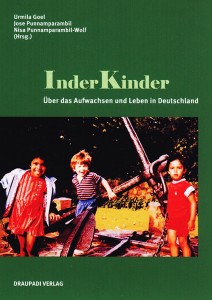A Visit to the Academy’s Reading Room
Why do we keep books like Muslime im säkularen Rechtsstaat (Muslims in Secular Rule of Law), Diaspora Identities, or z.B. 650 Jahre Rixdorf (E.g. 650 Years of Rixdorf) at the Jewish Museum? Answering this question is the task of the Academy Programs on Migration and Diversity. How to find these books, however, falls to the library.

Reading room of the Jewish Museum Berlin’s library
© Jewish Museum Berlin, photo: Mirjam Bitter
Imagine that you want to learn about social structures, clubs, and immigrant biographies in Berlin, particularly in Kreuzberg, to which you yourself moved from Hesse two years ago. After visiting the museum one fine Sunday afternoon, you take a look at the new Academy, where, you heard, a friend of yours recently attended an event about the ‘new Germans.’ The Academy is closed on the weekend, but a museum host informs you that it has a library. You return on Monday and ask in the reading room about Turks in Kreuzberg. The librarian would love just to tell you, “second shelf on the left, all the way to the back – what you’re looking for is right there.” Unfortunately, it’s not quite that simple. → continue reading
Dealing Creatively with Ethnic Classifications

Book cover
© Draupadi Verlag
Tomorrow at the Academy of the Jewish Museum Berlin, Urmila Goel and Nisa Punnamparambil-Wolf will introduce the book they edited, InderKinder – Über das Aufwachsen und Leben in Deutschland (Indian-Children: on Growing Up and Living in Germany, published by Drapaudi Verlag). It’s the third in a series of events on “New German Stories” where, with the aid of individual biographies, we examine Germany’s historical and current status as an immigration society. On this occasion we’ll focus on the children of immigrants from India, who gained public awareness for the first time during the “Green Card” campaign of 2000.
Prior to the reading and discussion tomorrow, we asked the two editors, Nisa Punnamparambil-Wolf and Urmila Goel, three questions:
What made you choose this title?
We’re referring with this title to the marginalizing “Kinder statt Inder” (children instead of Indians) campaign of the year 2000. The wordplay of InderKinder (Indian-children) is meant ironically: it was important to us to find a creative way to deal with these attributions. With the book, we want to show the varied ways that people who grew up and live in Germany handle the classification of being a child of Indian immigrants.
The book consists of two parts, autobiographical stories and essays. How would you explain your concept?
→ continue reading
On Why the Death of Stuart Hall Is a Loss for our Academy Programs
Stuart Hall, the renowned British cultural theorist and sociologist, passed away exactly one month ago, on 10 February 2014. His death prompted in us a deep sense of personal loss. His groundbreaking writings on cultural studies, in particular on racial inequality, were first translated into German in the mid 1990s—a time when people here were beginning to acknowledge the importance of racism as an issue.

Silent vigil of the Jewish Community at the Putlitz Bridge Deportation Memorial
Photo: Michael Kerstgens, Berlin Tiergarten, 1992
Hall’s approach incited a new discussion and coined a new vocabulary: until then, Germans in the Federal Republic had spoken of “Fremdenfeindlichkeit” (xenophobia), which they regarded as a marginal social phenomenon. Politicians and the media spoke matter-of-factly of society “reaching breaking point” when “the boat gets too full” owing to “Überfremdung.” The latter term denotes the state of ‘being overrun by foreigners.’ It is itself deeply racist and was accordingly voted Non-word of the Year 1993. “Being overrun” was presumed however to be explanation enough for the fire-bombings and other attacks then being carried out almost daily on asylum-seekers’ accommodation centers or immigrants’ apartments—and likewise for the hate campaigns, man-hunts, and pogrom-type riots erupting in Rostock, Hoyerswerda, and elsewhere, or the emergence of no-go areas in other towns and rural centers. In consequence, the law on asylum was altered in 1993 such that judicial opinion held it to have been “de facto repealed.” Therefore, anyone who wished to address the issue of racism as a structural phenomenon and thereby draw on theoretically sound academic sources had necessarily to turn to authors from England, France, the USA, or Canada—and repeatedly to Stuart Hall. → continue reading


